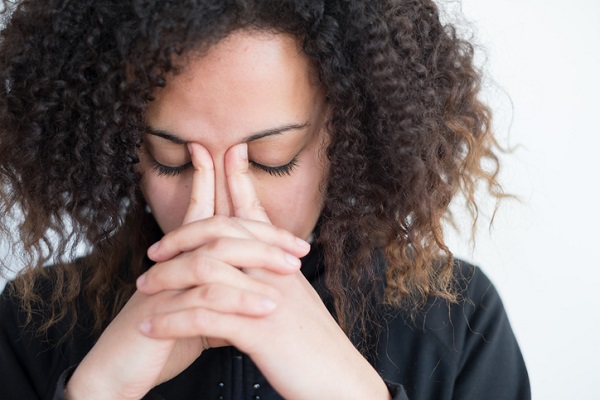A rapid heartbeat, sweaty forehead, shaking hands, and tense shoulders can all be part of a normal response to a stressful event (HealthLink BC, 2018). This might be a natural reaction to an important job interview, final exam, or move to a new city. However, for people living with anxiety, these feelings become a part of daily life, as events such as answering the phone, chatting with a co-worker, or purchasing groceries induce feelings of dread and apprehension.
Because feelings of anxiety can happen among the general population, many misconceptions persist regarding this common mental health problem (Stiehl, 2017). Some believe that everyday nerves are the same as having an anxiety problem and thereby dismiss people with a real illness as an “attention-seeker” (Stiehl, 2017). Others may think that people with anxiety simply lack strength or willpower. However, this is far from the case.
Anxiety can have a profound impact on an individual’s quality of life, affecting everything from their physical health to their relationships and professional achievement. Here is a closer examination of the impact this mental illness can have, as well as healthy coping mechanisms and other tools therapists can recommend.
What Is Anxiety?
Anxiety is the most common mental illness in Canada (Government of Canada, 2009). It affects approximately 10 per cent of the population and has been growing even more common in recent years (Government of Canada, 2009). However, it is important to note that anxiety is an umbrella term that includes many different illnesses. There are many types of anxiety disorders, including phobias, generalized anxiety disorder, social anxiety disorder, panic disorder, and more (HealthLink BC, 2018). For those living with anxiety, symptoms are so severe that they interfere with daily life. This can cause someone with social anxiety to grow withdrawn and lonely, while those with a phobia might go to extreme lengths to avoid triggers (HealthLink BC, 2018).
In addition, many people living with anxiety can experience panic attacks. These are characterized by extreme feelings of dread, as well as physical symptoms which differ depending on the person (HealthLink BC, 2018). Difficulty breathing, a rapid heartbeat, and a feeling of dissociation often accompany a panic attack, with many believing that they are dying or experiencing a heart attack (HealthLink BC, 2018).
Modern Factors Increasing Rates of Anxiety
While the exact causes behind anxiety disorders are still being researched, there are certain aspects that are currently understood. For example, we now know that there is a genetic component to anxiety disorders, and that those who have a family history of anxiety are at a higher risk of developing anxiety as well (Heid, 2017). However, experts are quick to point out that no single gene is responsible. Professor of psychiatry at Harvard Medical School Jordan Smoller notes that “Anxiety is a very complex condition, and many genes or variations within your genome may contribute” (Heid, 2017).
In addition to genetics, environment also affects whether a person will develop this problem (Heid, 2017). A recent study published in the Journal of Social and Clinical Psychology demonstrated a link between over-parenting and children developing anxiety later in life (Heid, 2017). Current environment can also have a substantial impact on whether an individual develops anxiety (Heid, 2017). An unpredictable and stressful environment, brought upon by financial stress, precarious employment, and political instability can increase rates of anxiety (Abebe, 2017). The American Psychological Association has even observed that the uncertainty and stress caused by climate change is also increasing rates of anxiety worldwide (Schlanger, 2017). In fact, many experts have asserted that due to these factors, millennials are the most anxious generation yet (Scott, 2018).

Financial stress and other environmental factors can affect anxiety
How You Can Help Clients After Counsellor Therapist Training
While each client will have different triggers, worries, and symptoms, there are many helpful coping mechanisms a counselling therapist can offer. For example, counsellors often help clients with anxiety address negative thought patterns (AnxietyBC, 2017). A client may catastrophize a normal occurrence and assume that a small mistake will have profoundly negative consequences (Mayo Clinic, 2017). For example, they might think to themselves: “I made a mistake on my assignment. I am stupid and will never pass this course.” (Grohol, 2018). Counsellors can help clients address these unhealthy patterns, turning overly negative outlooks into more balanced ones, such as: “Everyone makes mistakes. I can use this as a learning opportunity and do better next time” (Grohol, 2018).
Professionals with therapist training can also help clients face their fears through a process called exposure (AnxietyBC, 2017). The purpose of exposure therapy is to gradually expose a client to their fear, so that they can become increasingly comfortable when confronted by it (AnxietyBC, 2017).
Therapists may also teach their clients relaxation techniques such as breathing exercises and meditation (ADAA, n.d.). These, along with lifestyle changes such as regular exercise and proper sleep can help clients living with anxiety reduce the likelihood of having a panic attack, as well as alleviate other symptoms (ADAA, n.d.).
Would you like to study counselling, relationship counselling, and more?
Discover the opportunities that await at Rhodes Wellness College.
Works Cited
Abebe, Nitsuh (2017). America’s New ‘Anxiety’ Disorder. The New York Times Magazine. Retrieved from: https://www.nytimes.com/2017/04/18/magazine/americas-new-anxiety-disorder.html
ADAA (n.d.) Coping Strategies. Anxiety and Depression Association of America. Retrieved from: https://adaa.org/tips
AnxietyBC (2017). Self Help – Cognitive-Behavioural Therapy (CBT). Retrieved from: https://www.anxietybc.com/help-resources/cbt/self-help-cognitive-behavioural-therapy
HealthLink BC (2018). Anxiety. HealthLink BC. Retrieved from: https://www.healthlinkbc.ca/health-topics/anxty
Heid, Markham (2017). Just How Much Can You Blame Your Parents for Your Anxiety? Tonic. Retrieved from: https://tonic.vice.com/en_us/article/pakvn7/just-how-much-can-you-blame-your-parents-for-your-anxiety
Government of Canada (2009). Mental Health – Anxiety Disorders. Government of Canada. Retrieved from: https://www.canada.ca/en/health-canada/services/healthy-living/your-health/diseases/mental-health-anxiety-disorders.html
Grohol, John (2018). What is Catastrophizing? Psych Central. Retrieved from: https://psychcentral.com/lib/what-is-catastrophizing/
Mayo Clinic (2017). Positive thinking: Stop negative self-talk to reduce stress. Retrieved from: https://www.mayoclinic.org/healthy-lifestyle/stress-management/in-depth/positive-thinking/art-20043950
Schlanger, Zoë (2017). We need to talk about “ecoanxiety”: Climate change is causing PTSD, anxiety, and depression on a mass scale. Quartz. Retrieved from: https://qz.com/948909/ecoanxiety-the-american-psychological-association-says-climate-change-is-causing-ptsd-anxiety-and-depression-on-a-mass-scale/
Scott, Jody (2018). Why millennials are the most anxious generation in history. Vogue. Retrieved from: https://www.vogue.com.au/beauty/wellbeing/why-millennials-are-the-most-anxious-generation-in-history/news-story/755e7b197bdb20c42b1c11d7f48525cd?
Stiehl, Christina (2017). Stop Confusing Your Nerves With Having Anxiety. Tonic. Retrieved from: https://tonic.vice.com/en_us/article/bjgeg4/stop-confusing-your-nerves-with-having-anxiety










